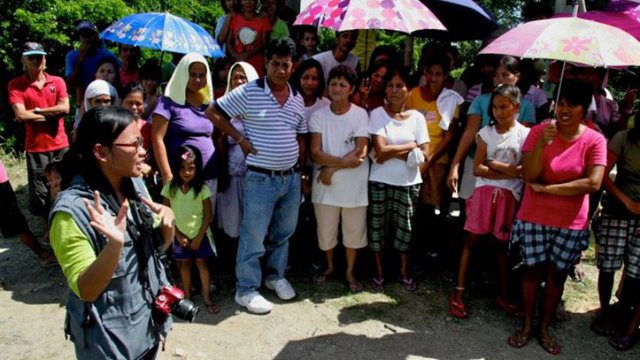SUMMARY
This is AI generated summarization, which may have errors. For context, always refer to the full article.

Every year, August 19 is celebrated as World Humanitarian Day, dedicated to aid workers who have lost their lives in the line of duty.
Last year, World Humanitarian Day focused on asking people what the world needs more of. This year, it turns the spotlight beyond solutions and looks at the people who work at solving them.
In 2014, we celebrate August 19 by looking at humanitarian heroes, people from different kinds of backgrounds who work at the same goal – saving lives and providing the basics of life to the most vulnerable from disasters and conflict.
These humanitarians are heroes in every sense of the word. In many cases, there are almost no similarities between them – different ages, races, genders, religions, beliefs. But though they come from all different parts of the world, with the same belief that those affected by disaster and conflict are entitled to the basics of life – food, water, shelter, protection, all in providing the most vulnerable with a life of dignity, taken away by disaster and conflict situations.
Heroes in our midst
In the Philippines, we have had our share of humanitarian heroes. As disasters become more frequent and more intense, we’ve learned that it takes every person to work at recovery, particularly when the disaster begins hitting historic scale.
Last November, while our country’s heart broke as Haiyan devastated the heart of the Philippines, so did the world’s, and they retaliated against the superstorm’s ferocity by sending in aid and assistance in overwhelming numbers. Humanitarian heroes came in droves, from different organizations and different fields, to do what they could to lift the country back to where it could be again. The country has recognized that we were not alone in standing up, but were supported by the entire world.

Over the course of five years working in Oxfam, I have seen firsthand the sacrifices of these humanitarian heroes. In devoting a life to humanitarian work, many times it means leaving your family for months at a time to work in a country with less comfort and worse circumstances. It means living out of a suitcase, working late hours and early nights. It means missing Christmas and working 31 days straight without a break. It means finding what little humor is there in tension and stress. It means consciously moving to where the problem is to be part of the solution, but putting yourself in less comfortable circumstances. I’ve learned that one of the things I take the most pride in is not just the products of our aid and assistance, but the people who work to produce this.
When I think of humanitarian heroes, I think of many people who have the spark and drive to do what they are born to do. It is in Duoi, a former community health volunteer turned international Public Health Promoter who has now been sent all over the world, with the most infectious smile on his face and loudest “Hep Hep Hooray!” during the most exhausting moments. It is in Abie, a Public Health Promoter, who has left his five beautiful daughters and wife behind in Cotabato for almost every disaster that has hit the Philippines, often in places that don’t understand his Muslim practices, but with the calm and patience that you rarely find in any person. It is in Libby, a tiny powerhouse of a Gender Coordinator, fighting to change mindsets and beliefs in the hopes of gender justice in the smallest of places. It is in international staff like Kaiser, Peter, and Phil who are committed to months or years here in the Philippines, away from their month-old babies or new wives, sending birthday love from Haiyan-affected areas to their countries in Bangladesh, Czech Republic and the United Kingdom. And lastly, it is in the new generation of young humanitarian workers we are breeding here in Haiyan, who started out as volunteers and survivors but have proved they have the spark and the passion to do this difficult work.
A riskier world for humanitarians
In the Philippines, humanitarians are welcomed and thanked and cried to in gratitude. Sadly, that is not the case in other countries. The world is becoming a place less safe for them to work in. In the last decade, the number of security incidents affecting humanitarian workers have tripled, placing more pressure on the need for safer spaces in which to provide humanitarian assistance.
There is a paradox in which the humanitarian field operates. Aside from the principle of humanity, which is the purpose to protect life and health and ensure respect for human beings, humanitarian agencies also operate under the principles of impartiality, neutrality and operational independence. Humanitarian workers are mandated to provide assistance on the basis of need, giving priority to the most vulnerable and most affected without making distinctions on race, nationality, gender, ethnicity, religion or any other defining characteristic that separates people from each other.

To operate in this way, it is necessary that humanitarian actors do not take sides or engage in controversies related to politics, religion, ideologies or race to operate under this principle of neutrality and protect the principle of impartiality. To work in this environment that delivers assistance to those that most need it under the most neutral of conditions, humanitarian actors must be autonomous and independent from political, economic, military, religious or other prevailing powers operating within an area where humanitarian work is being conducted.
In many places around the world, humanitarian workers are now faced with threats in the delivery of humanitarian assistance. Where humanitarian workers cannot work with arms or personnel that carry it, that does not mean that humanitarian workers operate in areas where arms and threats of violence do not occur.
Now, humanitarian workers are targets for providing assistance to those most in need, in opposite sides from those who hold power or often just caught in the crossfire between opposing forces.
Call to action
On World Humanitarian Day, your support is being called to safeguard the spaces in which humanitarians operate, for the world to abide by the humanitarian principles that should protect how assistance is delivered. This can be done by raising more attention and a sense of outrage that attacks on humanitarian workers are on the rise, as this should not be a new normal, not when conflicts are constant and disasters are increasing.
We should be putting pressure on duty bearers to ensure that assistance is getting through safely, regardless of what race, gender, religion, nationality, ethnicity and political affiliation the most affected fall under. After all, we are all entitled to the humanitarian imperative or the right to receive humanitarian assistance where it is needed, and to which it should be delivered with unimpeded access.
In the Philippines, where humanitarian work has not encountered the number of incidents in areas such as Gaza or Afghanistan, we should be promoting the understanding of humanitarian assistance and the obligation that we should provide the space to provide this without harm or hindrance. Particularly as we receive a generous part of the world’s generosity for Typhoon Haiyan but also for other disasters, we should hold ourselves to an example that we protect the spaces in which we deliver humanitarian assistance, in turn valuing the importance of everyday humanitarian heroes. – Rappler.com
Gabriela Luz has worked in emergencies and disaster risk reduction for
the last five years beginning with Typhoon Ondoy in 2009. She was the Deputy Programme Manager of Oxfam’s Haiyan Response, working with recovery and rehabilitation efforts.
iSpeak is Rappler’s platform for sharing ideas, sparking discussions, and taking action! Share your iSpeak articles with us: move.ph@rappler.com.
Tell us what you think about this article in the comments section below.
Add a comment
How does this make you feel?
There are no comments yet. Add your comment to start the conversation.